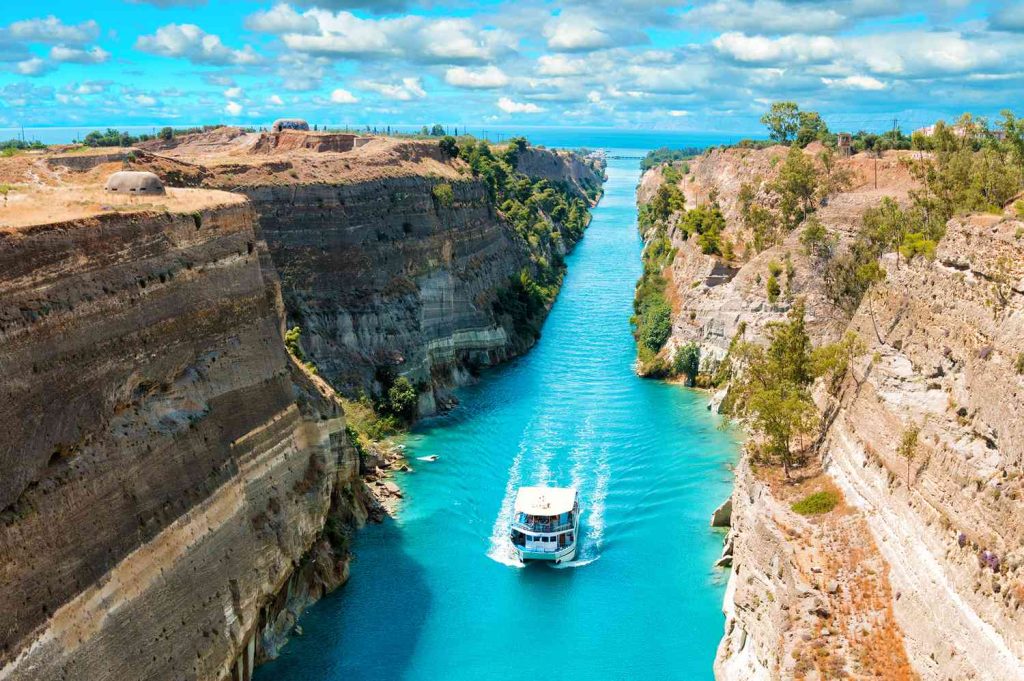:max_bytes(150000):strip_icc():format(jpeg)/TAL-header-corinth-canal-greece-OLDGRKCNAL0125-8ac0867e67a14fd7af7a59f5cc2bdab7.jpg)
Commonly referred to as the cradle of Western civilization, Greece is rich with archaeological treasures, from the marble columns of the Parthenon to the Oracle of Delphi. Many of these attractions are so popular, though, that the country recently adopted measures to thin out the high-season crowds. But one hidden gem remains largely overlooked by most travelers: the Corinth Canal.
A nautical marvel, the four-mile waterway is located about 50 miles west of Athens and slices through the Isthmus of Corinth, a narrow landmass separating the Peloponnese peninsula from the Greek mainland. The canal’s construction initially began under Roman Emperor Nero in 67 C.E. but wasn’t completed until 1893, after Greece gained independence from the Ottoman Empire. At roughly 40 miles in length and 80 feet wide, it connects the Ionian Sea with the Aegean Sea and is the world’s narrowest navigable canal — and this ancient wonder is a beauty to behold in person.
Jacqueline Deely/Courtesy of Abercrombie & Kent
The best way to experience the canal is on a small cruise since most modern boats are too large to thread the passage. Guests on the Abercrombie & Kent Adriatic Voyage, which features ports of call in Croatia, Montenegro, and Greece, can ride aboard the largest ship able to navigate the Corinth Canal. The explorer-class vessel is 59 feet wide, leaving around 11 to 5 feet of breathing room when passing through.
“The cool part is that you feel like you can touch the sides,” Susan Langley, a maritime archeologist and Abercrombie & Kent lecturer, told Travel + Leisure. “The amazing thing is just how narrow the canal is, and that [our ship] is really the capacity of what it can take. All the big ships have to go around it.”
Jacqueline Deely/Courtesy of Abercrombie & Kent
According to Langley, having a way to pass through the Peloponnese peninsula would have been a huge time and expense saver “back in the day when they had to rely on sails or on manpower to actually row a vessel.”
Today, though, the Corinth Canal primarily serves fishing boats, small merchant vessels, and boutique cruise lines. Abercrombie & Kent, however, makes it a point to turn the transit into a celebratory experience. As the ship passes through the canal, guests line the deck, champagne flutes in hand, and drift by rocky, plant-covered walls that feel close enough to touch.
The unique flora and fauna in the passageway are just as fascinating as its history. Visitors have the opportunity to spot a variety of diverse wildlife on the sandstone and limestone cliffs, from scampering foxes to nesting birds to fig trees, caper bushes, and acanthus — this iconic plant’s jagged leaves can often be found carved atop Greece’s ubiquitous Corinthian columns.
For travelers seeking something off the beaten path, the Corinth Canal passage with Abercrombie & Kent is an unforgettable experience that combines maritime history with jaw-dropping natural beauty — best of all, it isn’t something most tourists get to see.








